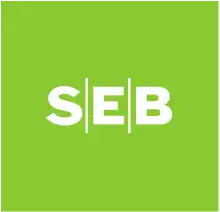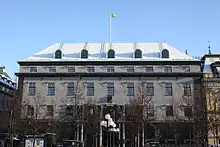SEB Group
Skandinaviska Enskilda Banken AB (Swedish pronunciation: [skandɪˈnɑ̌ːvɪska ˈêːnˌɧɪlːda ˈbǎŋːkɛn], "Scandinavian Individual Bank"), abbreviated SEB, is a Swedish financial group for corporate customers, institutions and private individuals with headquarters in Stockholm. Its activities comprise mainly banking services, but SEB also carries out significant life insurance operations and also owns Eurocard. The bank was founded and is controlled by the Swedish Wallenberg family through their investment company Investor AB.
 | |
| Type | Publicly traded Aktiebolag |
|---|---|
| Nasdaq Stockholm: SEB A | |
| Industry | Financial services |
| Predecessor | Stockholms Enskilda Bank (established in 1856) Skandinaviska Banken (established in 1864) |
| Founded | 1972 |
| Headquarters | Stockholm, Sweden |
Key people | Johan Torgeby (President and CEO), Marcus Wallenberg (Chairman) |
| Products | Retail banking, merchant banking, wealth management, life insurance, pensions |
| Revenue | SEK 46.94 billion (2014)[1] |
| SEK 23.35 billion (2014)[1] | |
| SEK 19.219 billion (2014)[1] | |
| AUM | SEK 1.708 trillion (end 2014)[1] |
| Total assets | SEK 2.614 trillion (end 2014)[1] |
| Total equity | SEK 134.54 billion (end 2014)[1] |
| Owner | Investor AB (20%) |
Number of employees | 15,714 (FTE, end 2014)[1] |
| Subsidiaries | SEB A/S (Denmark) SEB Pank (Estonia) |
| Website | www.sebgroup.com |

History
In 1972, Stockholms Enskilda Bank (established in 1856 by André Oscar Wallenberg) and Skandinaviska Banken (established in 1864) merged to form SEB. Reasons for the merger included creating a bank better positioned to serve corporate clients and to fend off competition from major international banks.
SEB acquired Swedish insurance company Trygg-Hansa in 1997, and integrated its life insurance activities. The property and casualty insurance portion of Trygg-Hansa was later sold.
In 1998, the company changed its logo and brand name from SE-Banken to SEB. At the end of that same year, SEB bought its first shares of the three Baltic banks Eesti Ühispank (Estonia), Latvijas Unibank (Latvia) and Vilniaus Bankas (Lithuania).[2] In 2000, SEB acquired Germany’s Bank für Gemeinwirtschaft (BfG) and the remaining parts of the three Baltic banks.[3]
In early 2001, the company announced plans for a merger with the FöreningsSparbanken (now Swedbank), which was called off when the European Commission demanded major concessions for its approval.
After several years of weak profitability, SEB sold its German retail banking operations to Spain's Banco Santander in January 2011.[4]
SEB sold its retail banking operations in Ukraine to Eurobank Group in June 2012.[5]
Business
In Sweden and the Baltic countries, SEB is a universal bank, offering financial advice and a wide range of financial services to all customer segments. In Denmark, Finland, Norway and Germany the bank’s operations have a strong focus on a full-service offering to corporate and institutional clients. SEB also have branches or representative offices in New York, São Paulo, London, Luxembourg, Geneva, Warsaw, Moscow, St Petersburg, Kiev, Beijing, Shanghai, Hong Kong, Singapore and New Delhi.
SEB serves 3,000 corporate and institutional customers, 400,000 small and medium-sized enterprises (SMEs) and more than 4 million individuals.[6]
Since January 2016, the company is operating through four business divisions; Large Corporates & Financial Institutions, Corporate & Private Customers, Life & Investment Management and Baltic.[6]
Corporate social responsibility
Since 2009, SEB has published a separate corporate sustainability report in line with Global Reporting Initiative (GRI) guidelines.[7] SEB is also committed to global initiatives such as the United Nation’s Global Compact, the principles for responsible investments, and the Equator principles.[8]
Since 2011, SEB has published sector policies for the renewable energy, arms & defence, shipping, mining & metals, fossil fuel and forestry industries. In addition, the company has position statements regarding climate change, freshwater and child labour.[6]
Subsidiaries
References
- "Annual Accounts 2014" (PDF). SEB. Retrieved 5 March 2015.
- "Annual Report 1998" (PDF). SEB's annual report 1998. Skandinaviska Enskilda Banken AB. Retrieved 20 January 2015.
- "Annual Report 2000" (PDF). SEB's annual report 2000. Skandinaviska Enskilda Banken AB. Retrieved 20 January 2015.
- "SEB completes sale of German retail banking business to Banco Santander". SEB Press release Jan 31, 2011. Skandinaviska Enskilda Banken. Retrieved 4 April 2014.
- "SEB completes sale of Ukrainian retail business". SEB press release June 8, 2012. Skandinaviska Enskilda Banken AB. Retrieved 4 April 2014.
- "sebgroup.com". Corporate website. Retrieved 4 January 2016.
- "Global Reporting Initiative (GRI) Index" (PDF). CS report 2009. Skandinaviska Enskilda Banken AB. Retrieved 20 January 2015.
- "SEB's corporate sustainability report 2013" (PDF). CS report 2013. Skandinaviska Enskilda Banken AB. Retrieved 20 January 2015.
External links
 Media related to Skandinaviska Enskilda Banken at Wikimedia Commons
Media related to Skandinaviska Enskilda Banken at Wikimedia Commons